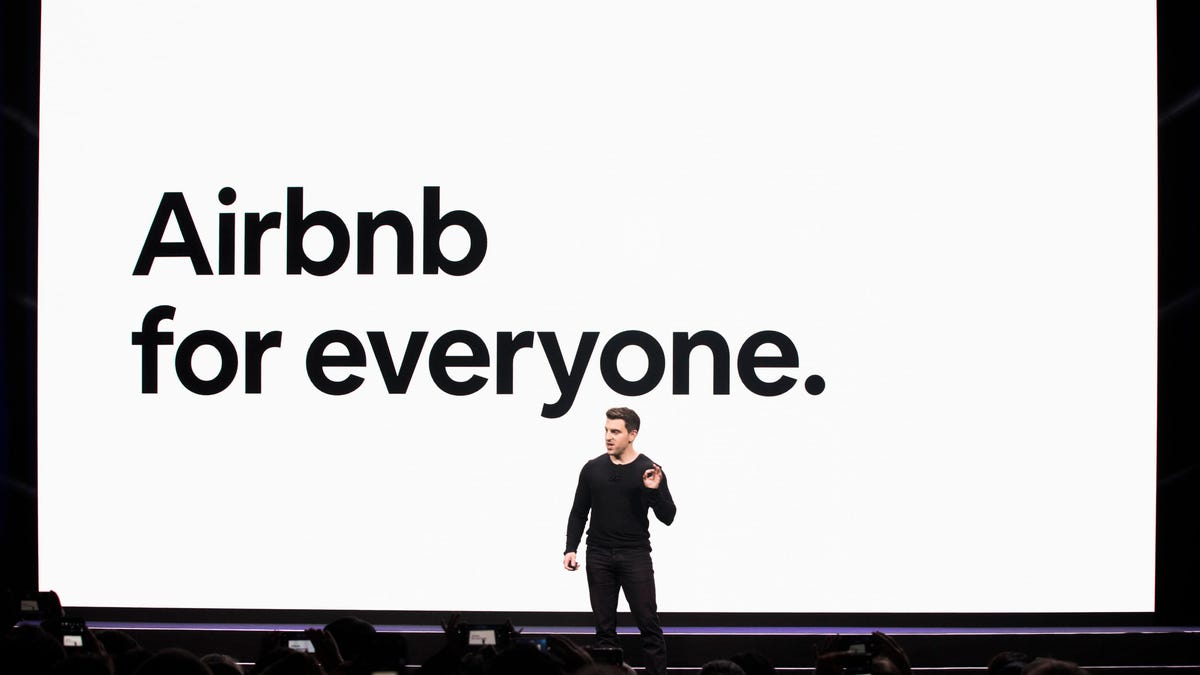Airbnb files for IPO, shows it can actually make a profit
Still, the coronavirus pandemic has given a major blow to the short-term rental business.

Airbnb CEO Brian Chesky at a company event in 2018.
Airbnb has filed paperwork for its initial public offering that shows, unlike other tech unicorns, it's been profitable in several quarters over the last couple of years. The revelation was included in the short-term rental company's 250-page filing with the US Securities and Exchange Commission on Monday.
During the third quarter of this year, Airbnb made $219 million in profit on revenue of $1.34 billion. Despite the positive outlook, those numbers are down nearly 19% from the same time last year when it reported $227 million in profit on revenue of $1.65 billion. The third quarter is the only quarter Airbnb made a profit so far this year.
The company said the reason for this is largely due to the hit it took as the novel coronavirus pandemic has ravaged travel destinations and people have adhered to shelter-in-place mandates.
"Our financial results for the first nine months of 2020 were materially adversely affected," Airbnb wrote in its filing. "We expect that COVID-19 will continue to materially adversely impact our bookings, revenue and business operations in future periods."
Airbnb said bookings on its platform fell by 72% in April from the year before. But, in June through September, the company said it began to see a rebound with bookings down around 20% from the year prior. To mitigate those losses, Airbnb laid off 1,900 employees, 25% of its staff, in May. It also raised $2 billion in debt funding in April.
Airbnb has gone from a website for couch surfers to having a massive online presence in just over a decade. It lists millions of homes for rent in nearly every country on Earth. But it's been a bumpy road for the company as it's seen scrutiny from city regulators and battles with local governments from San Francisco to New York to London.
"We are subject to a wide variety of complex, evolving, and sometimes inconsistent and ambiguous laws and regulations," Airbnb wrote in its filing. "And that could cause us to incur significant liabilities including fines and criminal penalties."
Though it's worked out deals with regulators in many cities, it's had to scale back its offerings and adjust to new rules, such as requiring hosts to register with cities and limits on how many nights a year people can rent out a home.
That means Airbnb has needed to rethink its business to stay competitive with hotels and similar sites like VRBO vacation rentals. In its filing, the company listed Bookings Holdings, Expedia Group, Google, TripAdvisor, Craigslist and various hotel chains as its competitors.
Over the past couple of years, it's expanded from offering homes for short-term rentals to letting travelers book day trips and restaurant reservations. It's also partnered with major landlords in California, Florida and New York that allow for Airbnb rentals through their buildings -- although some of those deals have fallen through.
Among the risks Airbnb listed in its filing is dangerous activity. The company acknowledged there have been shootings, fatalities, incidents of sexual violence and undisclosed hidden cameras on its platform. It also recognized that racial discrimination has been an issue. The company said it's taken several steps to combat this, including creating the "Airbnb Nondiscrimination Policy," which every host and guest must sign to use the service.
"If a host or guest does not agree to the policy, they are removed from our platform," Airbnb said. "Since 2016, approximately 1.4 million people have been removed from Airbnb for declining to agree to this policy."
Airbnb is the latest private company valued at more than $1 billion, aka unicorn, to head to Wall Street. Ride-hailing companies Uber and Lyft went public in 2019 and food delivery service DoorDash just filed it's IPO paperwork on Friday. None of these other three companies have yet proven to be profitable.
Along with the third quarter of this year, Airbnb reported profits during the second and third quarters of 2018 and the third quarter of 2019. Though it warned in its filing that full profitability isn't assured.
"We have incurred net losses in each year since inception, and we may not be able to achieve profitability," Airbnb said. "Our revenue growth rate has slowed, and we expect it to continue to slow in the future."
The company plans to trade on the Nasdaq under the symbol ABNB.

